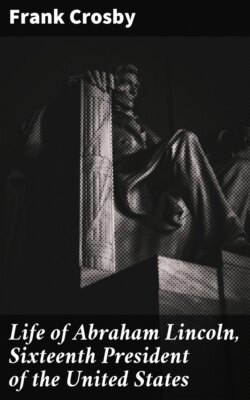Читать книгу Life of Abraham Lincoln, Sixteenth President of the United States - FRANK CROSBY - Страница 7
На сайте Литреса книга снята с продажи.
ОглавлениеIn this most vigorously prosecuted canvass Illinois was stumped throughout its length and breadth by both candidates and their respective advocates, and the struggle was watched with interest by the country at large. From county to county, from township to township, and village to village the two champions travelled, frequently in the same car or carriage, and in the presence of immense crowds of men, women, and children—for the wives and daughters of the hardy yeomanry were naturally interested—argued, face to face, the important points of their political belief and contended nobly for the mastery.
In one of his speeches during this memorable campaign, Mr. Lincoln paid the following tribute to the Declaration of Independence:—
“These communities, (the thirteen colonies,) by their representatives in old Independence Hall, said to the world of men, ‘we hold these truths to be self-evident, that all men are born equal; that they are endowed by their Creator with inalienable rights; that among these are life, liberty, and the pursuit of happiness.’ This was their majestic interpretation of the economy of the universe. This was their lofty, and wise, and noble understanding of the justice of the Creator to His creatures. Yes, gentlemen, to all His creatures, to the whole great family of man. In their enlightened belief, nothing stamped with the Divine image and likeness was sent into the world to be trodden on, and degraded, and imbruted by its fellows. They grasped not only the race of men then living, but they reached forward and seized upon the furthest posterity. They created a beacon to guide their children and their children’s children, and the countless myriads who should inhabit the earth in other ages. Wise statesmen as they were, they knew the tendency of prosperity to breed tyrants, and so they established these great self-evident truths that when, in the distant future, some man, some faction, some interest, should set up the doctrine that none but rich men, or none but white men, or none but Anglo-Saxon white men, were entitled to life, liberty, and the pursuit of happiness, their posterity might look up again to the Declaration of Independence, and take courage to renew the battle, which their fathers began, so that truth, and justice, and mercy, and all the humane and Christian virtues might not be extinguished from the land; so that no man would hereafter dare to limit and circumscribe the great principles on which the temple of liberty was being built.
“Now, my countrymen, if you have been taught doctrines conflicting with the great landmarks of the Declaration of Independence; if you have listened to suggestions which would take away from its grandeur, and mutilate the fair symmetry of its proportions; if you have been inclined to believe that all men are not created equal in those inalienable rights enumerated by our chart of liberty, let me entreat you to come back—return to the fountain whose waters spring close by the blood of the Revolution. Think nothing of me, take no thought for the political fate of any man whomsoever, but come back to the truths that are in the Declaration of Independence.
“You may do any thing with me you choose, if you will but heed these sacred principles. You may not only defeat me for the Senate, but you may take me and put me to death. While pretending no indifference to earthly honors, I do claim to be actuated in this contest by something higher than an anxiety for office. I charge you to drop every paltry and insignificant thought for any man’s success. It is nothing; I am nothing; Judge Douglas is nothing. But do not destroy that immortal emblem of humanity—the Declaration of American Independence.”
In the election which closed this contest, the Republican candidate received 126,084 votes; the Douglas Democrats, 121,940; and the Lecompton Democrats, 5,091. Mr. Douglas was, however, re-elected to the Senate by the Legislature, in which, owing to the peculiar apportionment of the legislative districts his supporters had a majority of eight in joint ballot.
